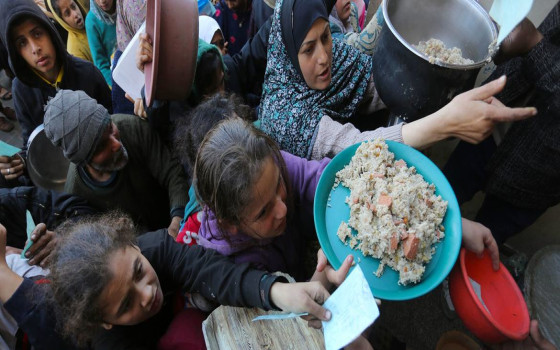
United Nations: A new report from the Famine Review Committee classifies food security in Gaza

- Europe and Arabs
- Monday , 18 March 2024 14:55 PM GMT
New York - Gaza: Europe and the Arabs
The Food Security Famine Review Committee is due to issue a report this week on the situation in the Gaza Strip, where UN teams on the ground have long warned of the risk of impending famine because not enough supplies have been allowed into the Strip since October 7. 2023. According to the publication of the United Nations News Bulletin website on Monday, he added, “Between December 8, 2023 and February 7, 2024, the entire population of Gaza - 2.2 million people - was classified at crisis level in the third stage of the Integrated Interim Classification, or Worst, the highest proportion of people facing high levels of acute food insecurity ever recorded by the IPC for any region or country
In light of growing concerns about alarmingly high rates of hunger in conflict-affected communities, and talk of worsening levels of food insecurity that may lead to famine, in this article we review how - and when - famine is classified.
Ahead of the release of the latest report on food security in the war-torn Gaza Strip, WFP Chief Economist Arif Hussein spoke with UN News about the stages of food insecurity and when specialized agencies declare famine.
When is famine declared?
Famine is a technical term, referring to a population facing widespread malnutrition and starvation-related deaths due to lack of access to food. Hussein said: “We say that there is famine when three conditions meet in a specific geographical area, whether it is a town, village, city, or even a country:
• At least 20% of the population in that region faces severe levels of hunger,
• 30% of children in the same place suffer from emaciation or extreme thinness for their height.
• The death rate has doubled compared to the average. This rate for adults is one death per 10,000 per day, and for children, it is two deaths per 10,000 per day.”
The World Food Program official said that famine is an acknowledgment of collective failure and that the time of its occurrence is not the time that calls for starting action, “because we must act before famine occurs, so that people do not starve, children do not become emaciated, and people do not die for reasons related to hunger.” .
What is the interim classification of food security?
The taxonomy is worked on by experts from 19 UN agencies - from the World Health Organization to the United Nations Children's Fund (UNICEF) - and four donor countries that together collect and analyze data to measure food insecurity and better target effective responses.
This system is a way to simplify data on food security, nutrition and mortality in a way that decision makers can understand in order to take appropriate action. For humanitarian agencies, the integrated classification system is an essential element in shaping humanitarian response plans.
The Food Security Index tracks hunger, but it can also sound the alarm ahead of the potential spread of acute malnutrition to avoid it turning into more serious, life-threatening conditions.
Famine Review Committee
If a famine is suspected, there is an additional step that requires the work of the Famine Review Committee to classify food security.
The panel consists of five globally recognized experts in their fields, from nutrition and health to food security. The committee meets as soon as famine-like conditions escalate, when more than 20% of those affected pass IPC Phase 5, i.e. catastrophic conditions or famine.
Experts meet and examine all data and analyzes provided by classification partners to determine whether the results are credible and justify a famine classification or a reasonable classification of potential famine. The experts then submit a report summarizing the situation and providing their forecasts for a period of 3 to 6 months, such as the Food Security Interim Report issued in December on the situation in Gaza.
The consensus-based process requires all partners to agree on an outcome that is verified by the Famine Review Committee. Arif Hussain said: “Because of this consensus and independence, we have greater confidence and belief in the results. It is not about the interest of one person versus another. It is a collective agreement on the situation, whatever it may be.”












No Comments Found